|
Limitar tu búsqueda
[+–] Editorial
[+–] Fecha
[+–] Formato
[+–] Idioma
[+–] Tipo de documento
[+–] Tipo de recurso
|

|
|
Feasibility analysis of an integrated health system: financial and distributive implications
The document presents spending projections and projections of the distributive incidence for an Integrated Health System under three basic scenarios: status quo, a two pillar scheme (financed through general taxes and private spending) and a three pillar scheme (financed through general taxes, social security contributions and private spending). By presenting these simulations, the study enhances...
|
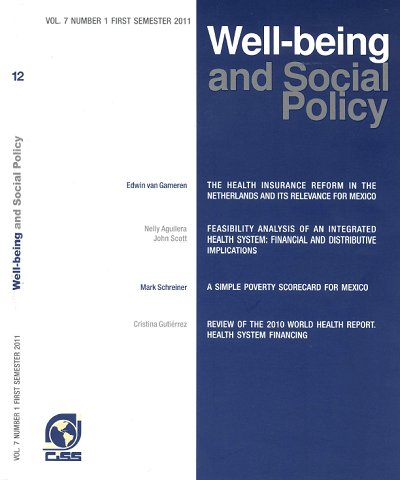
|
|
|
|

|
|
The health insurance reform in the Netherlands and its relevance for Mexico
Alrededor del mundo se observan dos versiones de la organización de los seguros de salud; la seguridad social basada en el empleo, y los servicios nacionales de salud. En Latinoamérica regularmente se usa la primera, pero se está lejos de lograr la cobertura universal. En los Países Bajos encontramos una peculiar mezcla de obligaciones públicas y responsabilidades privadas. La cobertura universal...
|
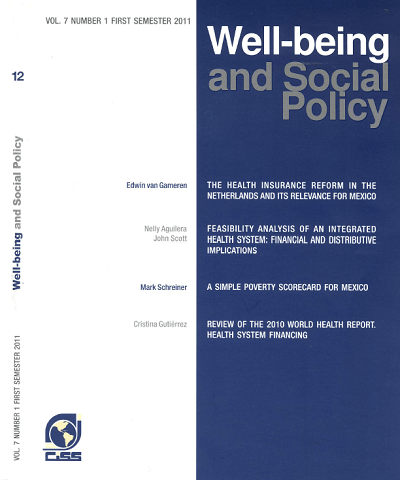
|
|
|
|

|
|
Book review. Violence and social orders: a conceptual framework for interpreting recorded human history, by Douglas C. North, John Joseph Wallis, and Barry R. Weingast
Why societies differ in their level of violence? This is the question addressed by North, Wallis, and Weingast. To provide an answer they must develop a rich theory of how individuals and organizations that compose a human group voluntarily surrender their will to act violently in exchange for participating in a society with improved conditions for the creation and conservation of wealth.
|
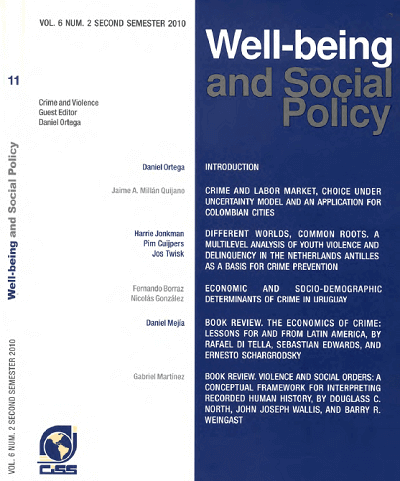
|
|
|
|

|
|
Book review. The economics of crime: lessons for and from Latina America, by Rafael Di Tella, Sebastian Edwards, and Ernesto Schargrodsky
The Economics of Crime: Lessons for and from Latin America makes an important contribution to the study of crime and violence in Latin America and to the debate about what works for reducing crime (and at what cost?). As the title of the book correctly suggests, the book brings together contributions from Latin American economists on the determinants and consequences of crime, as well as...
|
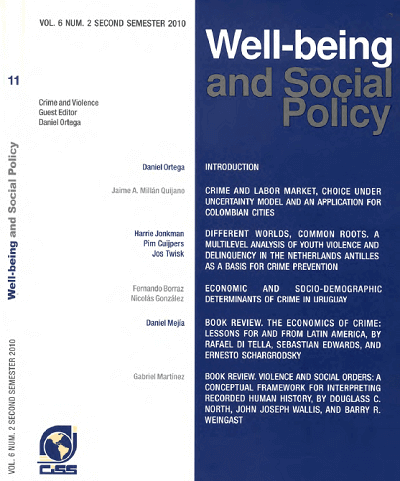
|
|
|
|

|
|
Toward closing the evaluation gap: lessons from three recent impact evaluations of social programs in Latin America and the Caribbean
Despite recent growing demand from funders and governments, rigorous impact evaluations in Latin America and the Caribbean remain the exception rather than the rule. Many commissioned impact evaluations are methodologically weak, and thus only marginally useful in assessing the impact of social interventions. Other impact evaluations feature strong research methodologies at their conception, but...
|
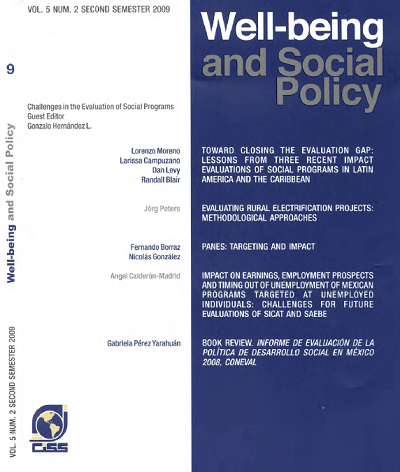
|
|
|
|

|
|
"La Nocturna": study of educational choice in Colombia
This study uses data from Colombia’s 2003 Encuesta de Calidad de Vida to examine how well do electricity strata (proxy for socioeconomic status) explain the choice decision for type of institution and session attended. In the model of choice by type – private vs. public universities – I find that as the electricity strata increases, the marginal probability of enrolling in a public university...
|
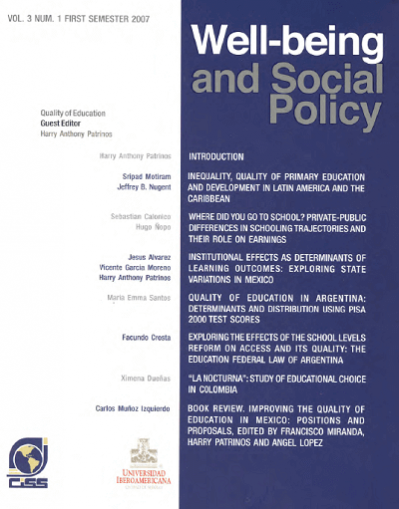
|
|
|
|

|
|
Strategic map of financial inclusion: a working tool
Various circumstances make difficult the rigorous study of processes, strategies and impact of V the efforts of financial inclusion and penetration, either at the academie level, in the public policy area or in companies and organizations of financial services industry. The central problem in Mexico has been the lack of a unified agreement on the definition and the low comprehension level of the...
|
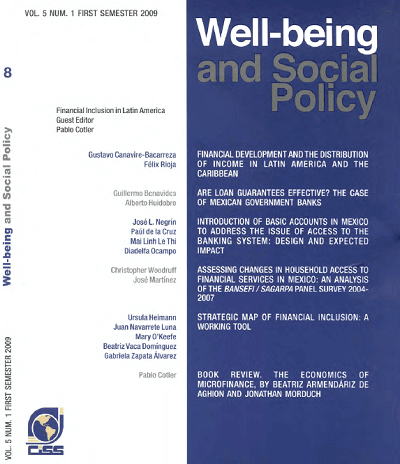
|
|
|
|

|
|
Catastrophic expenditure in health and income elasticities by item of expenditure in health services in Mexico
The objective of this article is to put in economic perspective the expenditure in health within the pattern of family expenditure of the Mexican households. Information of the National Survey on Income Expenditure of Households (ENIGH) of Mexico of 2004 is analyzed on: structure of the expenditure of the households, expenditure in health and income-expenditure elasticities in health; by...
|
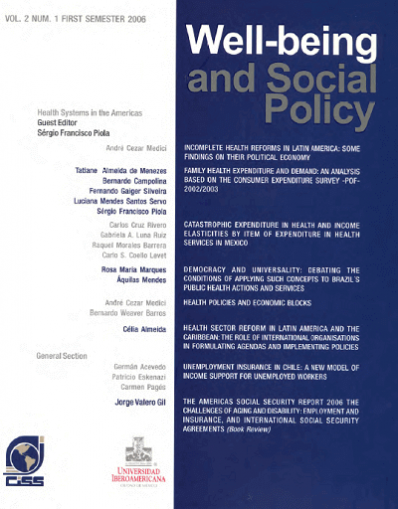
|
|
|
|

|
|
The effect of migration on the labor market outcomes of the sender household: a longitudinal approach using data from Nicaragua
In this paper, I use longitudinal data from the 1998 and 2001 Living Standard Measurement Surveys in Nicaragua to examine the impact of the emigration of household members on the household labor market integration and poverty. The main findings of the paper are that households from which an emigrant left had a reduction in members, a reduction in working members, a reduction in labor income than...
|
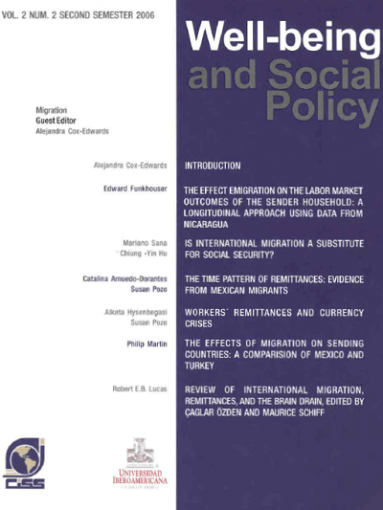
|
|
|
|

|
|
Introduction (about an international conference on "The effects of migration on sending countries")
The Inter-American Conference on Social Security (CISS) and Universidad Iberoamericana (UIA) co-hosted an international conference on “The Effects of Migration on Sending Countries” in February of 2006. The major objective of the conference was to examine a variety of channels through which migration affects the sending countries. Migrants change the dynamic of sending households; alter labor...
|
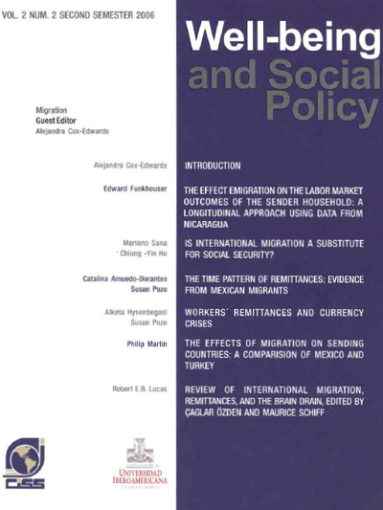
|
|
|
|

|
|
The Americas Social Security Report 2006 The challenges of aging and disability: employment and insurance, and international social security agreements (book review)
The 2006 Issue of the Report on Social Security in the Americas is divided in four chapters. The first two chapters address older-adult issues, the third chapter deals with disability-related problems, and the fourth chapter discusses Social Security agreements in the Americas. In the Presentation, it was pointed out that the objective of the Report on Social Security in the Americas is to become...
|
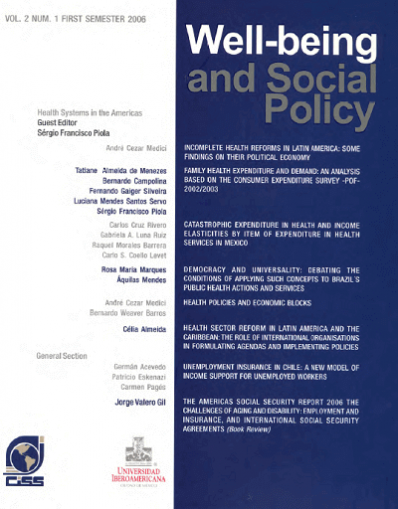
|
|
|
|

|
|
Unemployment insurance in Chile: a new model of income support for unemployed workers
This paper describes the Chilean experience concerning the implementation of a new unemployment insurance (UI) program. The use of individual savings accounts and private management are essential elements. In addition, a redistributive fund (Common Fund) helps workers pool risks, distributing resources from employed to unemployed workers and from stable firms to workers with low incomes and...
|
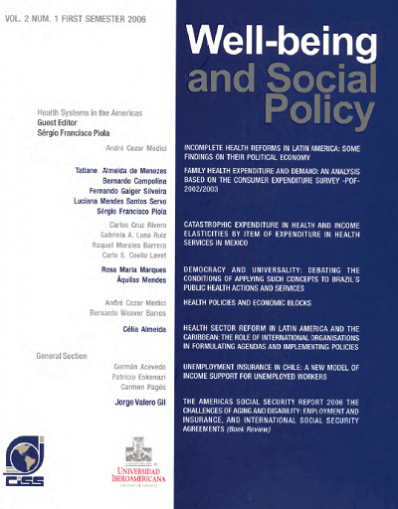
|
|
|
|

|
|
Health sector reform in Latin America and the Caribbean: the role of international organisations in formulating agendas and implementing policies
This article examines health sector reforms in Latin America and the Caribbean to discuss the ideological, theoretical, and conceptual elements that inform the reform agenda and the models put forward for attaining greater equity in the region’s countries. Its starting assumption is that the relevant literature generally neglects the economic, social, and political aspects underlying the...
|
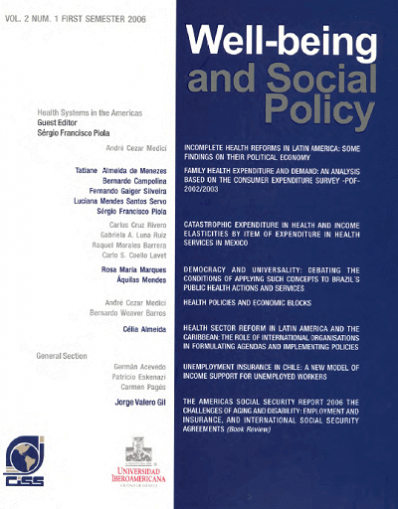
|
|
|
|

|
|
Health policies and economic blocks
This paper analyzes the roles of health goods and services markets within the regional integration process. It is a known fact that the consolidation of integrated markets is slower regarding social goods and services (as health and education) than among other goods and services (e.g. durable consumption goods). The paper discusses the nature of the health sector and its global dimension, showing...
|
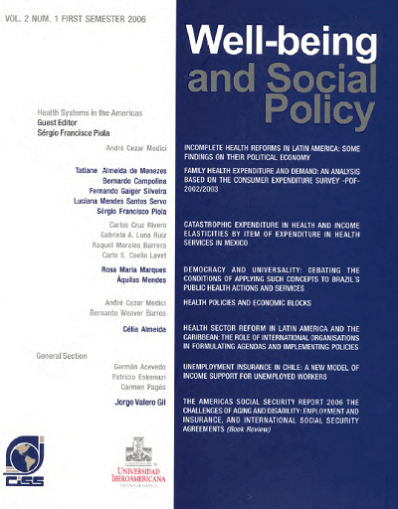
|
|
|
|

|
|
Democracy and universality: debating the conditions of applying such concepts to Brazil's public health actions and services
This paper reviews the determinants and conditionalities of the process of universalizing public health in developed countries, notably the European ones, and in Brazil, and is aimed at highlighting their differences. The first part discloses the main interpretations on the constructing of the Welfare State, emphasizing the characteristics of that historical moment and its articulation with...
|
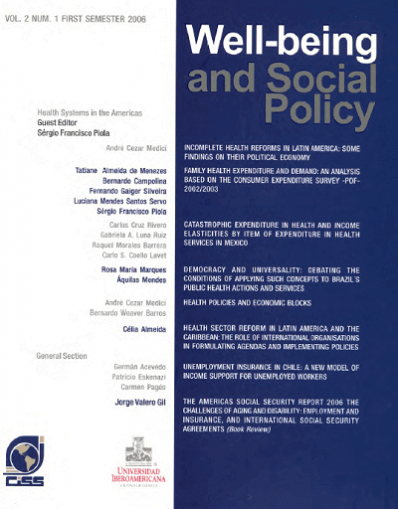
|
|
|
|

|
|
Family health expanditure and demand: an analysis based on the consumer expenditure survey - POF - 2002/2003
This paper aims at analyzing healthcare expenditure and demand of families, by estimating income-elasticity and price-elasticity for ten groups of products using the so-called model Linear Almost Ideal Demand System (LAIDS). The 2002/03 consumer expenditure surveys (POF) of the Fundação Instituto Brasileiro de Geografia e Estatística – FIBGE (Brazilian census bureau) are used, providing extremely...
|
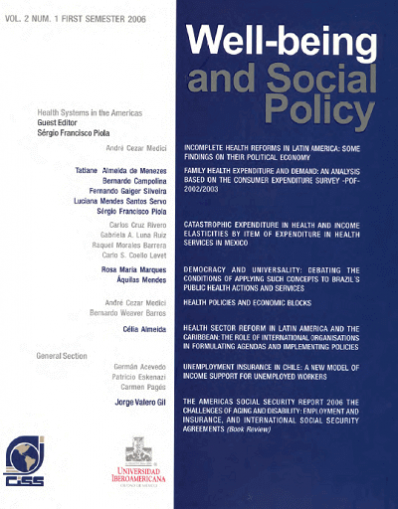
|
|
|
|

|
|
The time pattern of remittances: evidence from mexican migrants
We explore the time pattern of remittances using data on return migrants from the Mexican Migration Project. Some of these return migrants have settled in the U.S. and are returning to Mexico to visit family and friends, whereas others are temporary migrants returning home after a working spell in the U.S. We find that the dollar amount remitted first increases with time spent in the U.S. to...
|
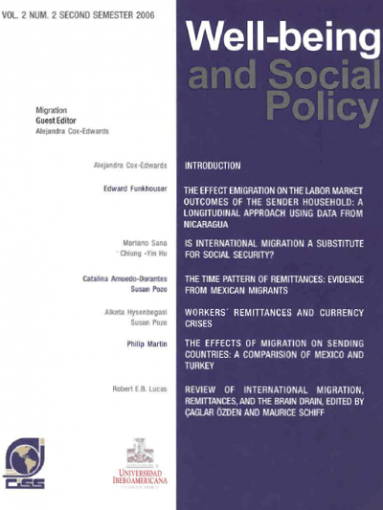
|
|
|
|

|
|
Incomplete health reforms in Latin America: some findings on their political economy
This paper raises the point that only few health reforms implemented in Latin American countries modified the existing health systems in order to fix the problems brought by the institutional fragmentation typical of this sector. A great part of these reforms did not implemented the necessary measures to improve coordination among health systems in the prevailing pluralistic model and besides,...
|
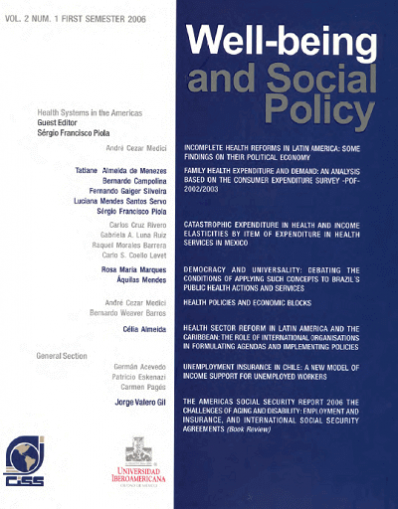
|
|
|
|

|
|
The Americas Social Security Report 2005: labor markets and the fragmentation of social insurance, financing for HIV-AIDS by social security (Book review)
The Americas Social Security Report 2005, published by the CISS, gathers the contributions, opinions, and comments of more than 30 social security specialists from different countries in the American continent, as well as the review of the most recent literature on this matter. The purpose is to present, to specialized public and to laymen, a detailed, analytic, and updated report of the...
|
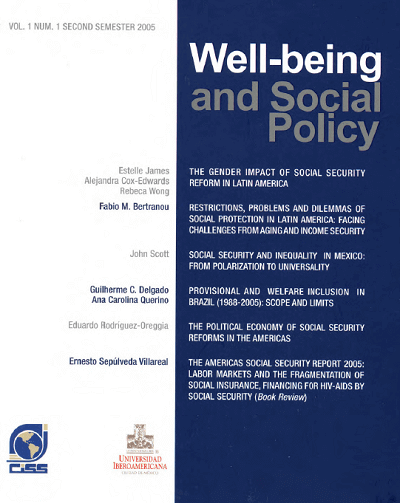
|
|
|
|

|
|
The political economy of social security reforms in the Americas
This paper analyses the factors affecting the decision to apply a reform (parametric and structural) in the Americas, which may hold a specific set of conditions, i.e. a sui generis political system and a high degree of economic openness, among others. Economic freedom is relevant in the case of structural reforms, while results for the share of older population are not conclusive. It may be that...
|
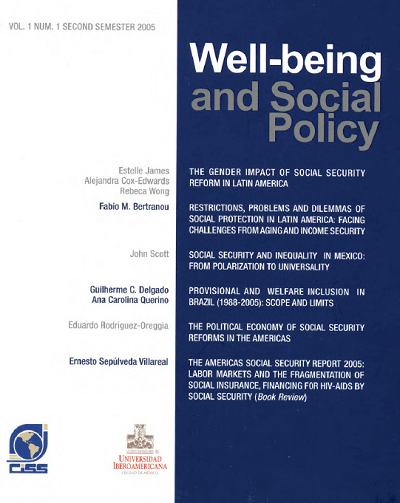
|
|
|
|
|